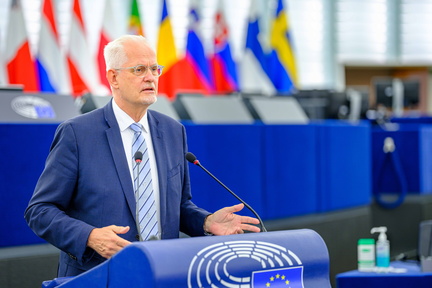Sarvamaa: High time to act on Rule of Law
13.9.2021

The European Parliament has done its job, in helping deliver the Rule of Law Conditionality Regulation. The European Commission now needs to act, writes Petri Sarvamaa
The Rule of Law situation in the European Union has been deteriorating over recent years. This is barely news to anyone.
The European Parliament has discussed the matter many times and reiterated its position on several occasions: this deterioration has to stop.
Parliament has done its job; we negotiated the Conditionality Regulation with the Council under the German presidency in under five weeks. The regulation entered into force in 2021, but we are still waiting for the European Commission to act.
In the meantime, we have received a constant stream of messages from citizens who are worried about their liberties, about minorities being repressed, free media being shut down or bought by government oligarchs, judicial systems being party-politicised and independent judges being replaced by party loyalists.
All this supported by money distributed from the Union’s budget to the Member States; taxpayers’ money.
This is a disgrace and should not be happening in Europe of 2021. Authoritarian structures have been established within many governments and are particularly present in certain member states, namely Hungary and Poland.
EU funds must not be used for anti-democratic activities or for strengthening authoritarianism
Indeed, the deterioration of the Rule of Law in many EU Member States resembles a domino effect.
When an autocratic leader or a corrupt oligarch with a tendency towards authoritarianism sees how the leader of a neighbouring country can successfully stay in power for decades, while at the same time benefiting from the receipt of EU funds for themselves and their inner circle, there is strong temptation to try the same approach.
However, I believe that the new Rule of Law Conditionality Regulation will dampen the enthusiasm of leaders to stretch the limits of democracy, at least in clear daylight.
The Hungarian government has, it appears, sensed a wind of change blowing across Europe and is now making every effort to hide EU taxpayers’ euros behind various semi-public organisations.
The Rule of Law Conditionality Regulation applies specifically to states and public actors, and that is why the Hungarian Government has begun transferring a significant portion of its wealth to private foundations close to Orbán’s Fidesz party, hidden from sight. The EU must not overlook this.
We know what’s happening, where, and what we should do about it. There is no time to waste. How can we explain to people that the EU finally has the tools to use against Rule of Law breaches but doesn’t want to use them?
We MEPs have stated our readiness on numerous occasions and have done everything we can within our powers. However, the Parliament lacks implementing powers.
A large chunk of the responsibility lies within the Member States themselves. The treaties have made finding unanimity in the Council very difficult when considering punitive actions such as Article 7.
Furthermore, Council and Member States seem to be blackmailed by the same group that terrorised the MFF and Next Generation EU negotiations last autumn. Ultimately, it is in the Member States’ hands as to how they respond to the growing deterioration of the Rule of Law in Europe.
This brings us back to the Commission. We have put pressure on the EU Executive and demanded quick action. The Parliament has launched Article 265 of the TFEU that legally calls on the Commission to act.
This is our latest plea for the Commission to take concrete action to initiate the process of the Conditionality Regulation by sending written notifications to Member States concerned.
There is no need to wait for the ECJ ruling, the superficial Council Conclusions from December 2020 do not bind us to that.
However, shooting the messenger doesn’t solve the problem. Taking the Commission to court now will not solve our rule of law issues. Instead, it will look like an internal EU tug-of-war.
The Rule of Law Conditionality Mechanism must be used in an unequivocal and well-prepared case. It is clear that a concerned Member State is going to fight back against the Conditionality Mechanism at the European Court of Justice.
In my view, it is crucial that the Commission first collects the necessary evidence before taking action. However, here the Commission already has material concerning some Member States. Even the Parliament has produced an external legal assessment for a case against Hungary that is free for the Commission to use.
According to the regulation, the Commission will send a written notification to a Member State that has abused the EU budget and violated the rule of law.
The Member State may then submit its own evidence or amend its legislation. If this is not the case, the Commission may suspend, freeze or recover EU funding. Ultimately, Member States will be able to challenge cases before the EU Court of Justice. This is where the Commission needs to stay vigilant: the first cases must be won.
Parliament, Council and the Commission need to work together as allies. Fixing the Rule of Law demands a lot of hard work from all of us. Parliament has been relatively patient, but we also like to think of ourselves as pacesetters, helping the Commission and the Council to reach ever-higher goals.
We have a common understanding, and we have the means, all we need is the final will to act. I believe that this autumn will finally deliver this momentum, and I know we are ready.
Published on The Parliament Magazine 10/9/2021




